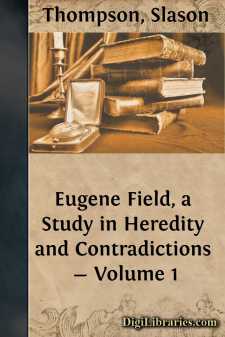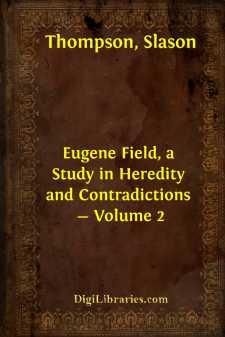Categories
- Antiques & Collectibles 13
- Architecture 36
- Art 48
- Bibles 22
- Biography & Autobiography 813
- Body, Mind & Spirit 142
- Business & Economics 28
- Children's Books 15
- Children's Fiction 12
- Computers 4
- Cooking 94
- Crafts & Hobbies 4
- Drama 346
- Education 46
- Family & Relationships 57
- Fiction 11829
- Games 19
- Gardening 17
- Health & Fitness 34
- History 1377
- House & Home 1
- Humor 147
- Juvenile Fiction 1873
- Juvenile Nonfiction 202
- Language Arts & Disciplines 88
- Law 16
- Literary Collections 686
- Literary Criticism 179
- Mathematics 13
- Medical 41
- Music 40
- Nature 179
- Non-Classifiable 1768
- Performing Arts 7
- Periodicals 1453
- Philosophy 64
- Photography 2
- Poetry 896
- Political Science 203
- Psychology 42
- Reference 154
- Religion 513
- Science 126
- Self-Help 84
- Social Science 81
- Sports & Recreation 34
- Study Aids 3
- Technology & Engineering 59
- Transportation 23
- Travel 463
- True Crime 29
Eugene Field, a Study in Heredity and Contradictions - Volume 1
by: Slason Thompson
Categories:
Description:
Excerpt
CHAPTER I
PEDIGREE
"Sir John Maundeville, Kt.," was his prototype, and Father Prout was his patron saint. The one introduced him to the study of British balladry, the other led him to the classic groves of Horace.
"I am a Yankee by pedigree and education," wrote Eugene Field to Alice Morse Earle, the author of "The Sabbath in Puritan New England," and other books of the same flavor, "but I was born in that ineffably uninteresting city, St. Louis."
How so devoted a child of all that is queer and contradictory in New England character came to be born in "Poor old Mizzoorah," as he so often wrote it, is in itself a rare romance, which I propose to tell as the key to the life and works of Eugene Field. Part of it is told in the reports of the Supreme Court of Vermont, part in the most remarkable special pleas ever permitted in a chancery suit in America, and the best part still lingers in the memory of the good people of Newfane and Brattleboro, Vt., where "them Field boys" are still referred to as unaccountable creatures, full of odd conceits, "an' dredful sot when once they took a notion."
"Them Field boys" were not Eugene and his brother Roswell Martin Field, the joint authors of translations from Horace, known as "Echoes from the Sabine Farm," but their father, Roswell Martin, and their uncle, Charles Kellogg, Field of Newfane aforesaid.
These two Fields were the sons of General Martin Field, who was born in Leverett, Mass., February 12th, 1773, and of his wife, Esther Smith Kellogg, who was the grandmother celebrated in more than one of Eugene Field's stories and poems. Through both sides of the houses of Field and Kellogg the pedigree of Eugene can be traced back to the first settlers of New England. But there is no need to go back of the second generation to find and identify the seed whence sprang the strangely interesting subject of this study.
At the opening of the nineteenth century, as now, Newfane, then Fayetteville, was a typical county seat. This pretty New England village, which celebrated the centennial of its organization as a town in 1874, is situated on the West River, some twelve miles from Brattleboro, at which point that noisy stream joins the more sedate Connecticut River. It nestles under the hills upon which, at a distance of two miles, was the site of the original town of Newfane—not a vestige of which remains to remind the traveller that up to 1825 the shire town of Windham County overlooked as grand a panorama as ever opened up before the eye of man. The reason for abandoning the exposed location on the hills for the sheltered nook by the river may be inferred from the descriptive adjectives. The present town of Newfane clusters about a village square, that would have delighted the heart of Oliver Goldsmith. The county highway bisects it. The Windham County Hotel, with the windows of its northern end grated to prevent the escape of inmates—signifying that its keeper is half boniface and half county jailer—bounds it on the east, the Court House and Town Hall, separate buildings, flank it on the west....



